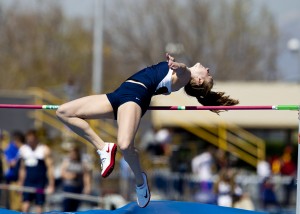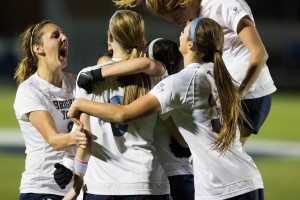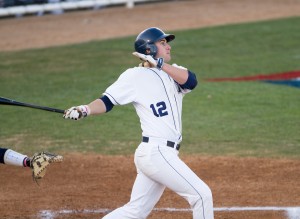They wake up at 6 a.m., often to train or hit the weight room before class. All of their classes have to be scheduled before 2 p.m. After grueling practice and extensive conditioning, they consider themselves lucky if they can start their homework and studying by 8 p.m. It is the struggle of a student athlete at Brigham Young University.

The life of a BYU student athlete faces many challenges specific to the unique culture and standards of the university, unforeseen to the eye of the public. The sports programs at BYU are expected to compete for national titles, all while maintaining a high level of academic standards, adhering to the strict honor code and fulfilling church and religious responsibilities.
For BYU senior football player Devin Mahina, the transition from high school to college and playing a sport wasn’t easy.
“It is way harder than I expected. College was 100% harder than high school,” Mahina said. “Teachers aren’t as lenient, and you are just on your own.”
Athletes at BYU have to compete not only in games but off the field, against some of the brightest and most capable students in the country.
For Mahina, catching passes and winning football games every week on national television is only one of his priorities.
“My academics are very important to me because I know I can’t play football forever,” Mahina said. “I need something else to fall in love with that I can do for the rest of my life. Right now is the time to figure that out.”
Mahina, like the rest of the students at BYU, is part of one of the most unique student bodies in all of the NCAA.
According to BYU statistics, in 2013, the average unweighted GPA of incoming freshman at BYU was a 3.82. The average ACT was an impressive 28.2. Of males attending BYU, 70% earned their Eagle Scout award, something completely uncommon at any other university. Of women, 82% put in countless of hours in high school to earn their Young Womens Recognition award. Of all students on campus, 97% have served in a class or a quorum presidency, and 96% graduated from 4 years of church seminary, which in many cases required students to wake up several hours before the start of their high school days to attend.
To compare BYU’s academic standards to other schools, the University of Utah’s average ACT score is a 24, and the average GPA of their admitted freshman is a 3.55. At San Diego State University, the average GPA is 3.6 and their average ACT score is a 24. Boise State University’s admittance averages are a 3.4 and a 23 on the ACT. The University of Alabama, a powerhouse football school, has an average GPA of 3.6 for admitted freshman and an ACT score of 26.
It is no secret: BYU is a tough and competitive university. With such a high caliber of students accepted on an academic level, keeping up in the classroom can be brutal. Whether it be American Heritage or Economics, students have a lot expected of them. For the average student, a full load of classes is enough to get them up early in the morning, in the library during the day, and home late at night. Add in the time spent in their sport for student athletes, and it can become overwhelming.

With such a high academic standard, both fans and critics alike often accuse NCAA student athletes of being far more invested in their sport than their education, potentially being offered shortcuts in the classroom. Trevor Wilson, the director of the Student Athlete Academic Center, said that while that may be the case elsewhere, it is not in his academic center.
“Students here can’t count on a policy or procedure to bail them out of their personal responsibilities,” he said. “That’s not always the case at every institution across the United States, but it absolutely is the case at BYU.”
Wilson said that between academics and sports, the challenge of being a student athlete is heavier than many might think.
“Outside of athletics, people don’t realize the pressure that is on a student athlete. Some people seem to think that these students can make a decision to go with their team or when to take a test, whatever is best,” Wilson said. “Athletes don’t have that choice. They have an absolute contract that they signed, committing fully to their athletic program — which includes all the practice times, all the travel times, and even beyond that, the pressure to win.”
For spectators and fans, winning is the goal. A good fan base expects a winning program, and BYU has some of the best fans in the country. The student athletes and coaches share that same goal: to win.
Teams at BYU are still expected to compete against the best schools in the nation. To win, Wilson said, student athletes have to add in to their academic schedules the equivalent time of a full-time job.
“Any good athlete will tell you, although the NCAA mandates what practice time can be, when you add all things together you’re looking at 30–40 hours a week,” Wilson said.
In addition to sports and academics, student athletes at BYU have something else to factor in too: church. In the predominantly LDS community that makes up BYU, members of the church are expected to contribute to their congregations in a variety of ways. Often, these assignments can add hours to a student’s week.
“That can be hard, because when you finally start to feel like you have free time, it’s time to do home teaching, or you have some meeting to go to during the week,” Mahina said.
At BYU, the sports week is also shortened by a day. In the LDS Church, Sunday is observed as a day of rest and is mandated by the university to be so. As a result, athletes do not get a chance to train or work out with their teams on Sundays.
For a player like Mahina, it is not uncommon to get back late from an away game on a Saturday, feeling sore and in need of some recovery time, and have to wake up early on Sunday for meetings or other church responsibilities. That church factor is something few, if any other, universities have to deal with and is an added challenge to the success of BYU sports.
Friends and roommates of players can attest to their busy schedules. BYU sophomore Taylor Weitzeil shares an off-campus home with BYU women’s basketball players Lexi Eaton, Ashley Garfield and Carly Stratton.
“I pretty much don’t see them during the season,” Weitzeil said. “Half the time they’re away on a roadtrip, and the other half they’re catching up on what they missed while they were gone.”
BYU is a large university with national relevance worldwide. BYU recently proved that status by winning the NCAA’s 6th Fan contest, in which BYU fans cast more than 5 million votes to beat out every other Division I school in the nation. With such a widespread and dedicated fanbase, BYU athletes are in the spotlight and also under the microscope of social media

Several times in the past, BYU student athletes have had relatively common mistakes go viral on the Internet and made known to everyone, simply because of social media and the unique expectations of BYU athletes.
BYU Athletics Compliance Coordinator Jennifer Funkhouser works daily with student athletes as they strive to meet NCAA, conference and institutional rules and regulations. To her, the issue is a matter of understanding what student athletes have to go through.
“They represent the image of the university wherever they go,” Funkhouser said. “Because of this, student athletes are scrutinized more closely, and any mistakes made have the potential to be discussed more openly amongst the public in this age of social media.”
The social media factor was not around as recently as 10 years ago. Now with everyone owning smartphones and on Twitter, news can spread like wildfire, whether it is true or not.
“People need to remember that while student athletes are elite individuals who have excelled in their sport, they are still human and will occasionally make mistakes,” Funkhouser said.
Being human, student athletes still want to have fun in college and try to enjoy the time they have. For both Funkhouser and Wilson, the quality of student athletes’ social lives is a concern.
“The thing that I worry about with our student athletes is their ability to have time with family, and to have normal, unstructured time that all of us need,” Wilson said. “To read, to relax, to spend time with mom, dad, wife, children. Just not worry. And there’s not a lot of time for that, which is definitely an added pressure.”
Despite all of the challenges, Wilson said the graduation rate for BYU student athletes is higher than comparable universities, and he credits that to outstanding character and tireless dedication both on and off the field.
“We graduate a higher rate of our student athletes than comparable universities, and that truly is because of the caliber of individuals that come here and the culture in which they were raised.”




